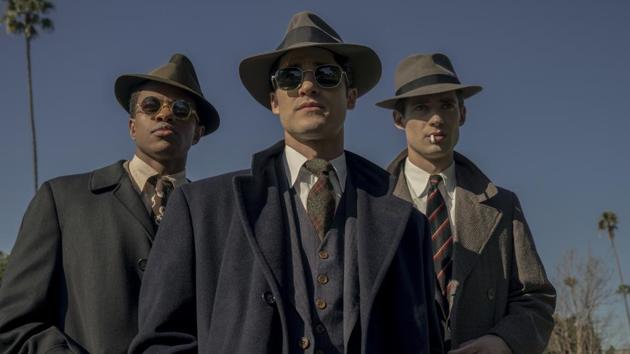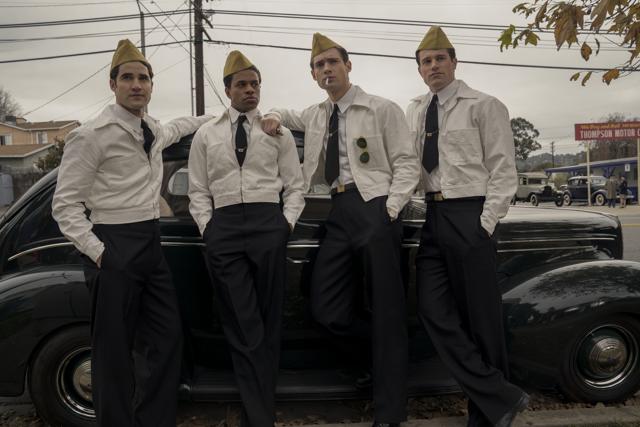Hollywood review: New Netflix series is a ludicrous version of La La Land
Hollywood review: Prolific producer Ryan Murphy’s new Netflix show, despite a solid cast and a big budget, is too delusional to be truly dramatic.
Hollywood
Creators - Ryan Murphy, Ian Brennan
Cast - David Corenswet, Darren Criss, Laura Harrier, Samara Weaving, Dylan McDermott, Jake Picking, Joe Mantello, Jeremy Pope, Jim Parsons, Patti LuPone

Netflix’s Hollywood is a bonkers show that imagines a fantastical world in which a gay, black man could walk hand-in-hand with his boyfriend, a movie star, in public, in the 1940s; a woman could be in-charge of a major movie studio, and an actor belonging to a minority race could be cast as the lead in the year’s biggest film. All this at a time when neither women nor black people enjoyed much freedom in America.
There is, of course, an argument to be made — and creator Ryan Murphy will probably make it — that presenting a hypothetical account of the Golden Age of Hollywood is sort of the point. But by introducing historical figures and diluting the very real discrimination that both women and minorities faced in the industry at the time, the show, about a group of young men and women whose destinies collide in the City of Dreams, ends up coming across as overwhelmingly trivial. It’s entertaining, for sure; in the way that most Ryan Murphy shows tend to be; but it’s also undeniably flawed.
Watch the Hollywood trailer here
The series imagines a world populated exclusively by decent souls, selfless human beings looking only to help each other in their endeavours. A subplot involving a prostitution ring has none of the gravity it ideally should have had, and is instead portrayed as a dream factory for aspiring actors. A pimp who convinces countless men to sell their bodies and souls to achieve their Hollywood dreams, knowing perfectly well that most of them won’t make it, is rewarded handsomely by the writers towards the end of the seven-episode miniseries.
The show’s only real antagonist — a terrible, terrible man, played by Jim Parsons — is shown not like the sexual predator that he is, but almost like a loveable loon, someone whose history of abusive behaviour the show is almost too eager to downplay. This isn’t to say that Parsons isn’t good in the show — he really is, as is most of the cast — but a character that should have been portrayed as a Harvey Weinstein-level creep is instead reduced to a mere ancestor of Ari Gold.
Also read: Feud review: Hollywood’s most disturbing rivalry is addictively brought to life
Everyone, including the kind-hearted pimp and the goofy sexual offender, is shown to have redeeming qualities. The others, meanwhile, are almost Jesus-like in their decency.
After a point, it becomes difficult to root for people who seem to have no hurdles to cross, nor obstacles to overcome. What they want is routinely handed to them — plum roles in popular pictures, women when they are feeling lonely, and moral support when it is needed the most. Characters who no longer serve a purpose in the plot, or are proving to be a hinderance in the progress of another (more important) person, are swiftly removed.

For a show that seems to be driven by a single-minded urge to retroactively rewrite history, it borders on self-parody towards the latter half. The show’s final episode is so outlandish that it should surrender its ‘emotional’ tag on Netflix and instead be classified under the ‘fantasy’ section. The alternate reality established in the early episodes is so flimsily defined that none of it seems believable when the risks begin to pay off.
There are moments of effective drama, such as the scene in which Eleanor Roosevelt comes to deliver a pep-talk on the importance of representation in movies, or another in which the de-facto female head of the central movie studio decides to go against the grain, and at great financial and personal risk cast a black actor as the lead of her film. It reminded me of a similar scene in Steven Spielberg’s The Post, in which Meryl Streep’s newspaper mogul decides to publish a story critical of the Richard Nixon government.
But the reason why the scene in The Post was so powerful, and the one in Hollywood merely comes across as a subpar remake of it, is because one feels resoundingly real, and the other indefensibly made-up.
“Success is counted sweetest,” wrote the poet Emily Dickinson, “By those who ne’er succeed. To comprehend a nectar, requires sorest need.” This is a show without any stakes, despite its impressively large scale; it is a show without relatable characters, despite being overpopulated.
Unlike the revisionist films of Quentin Tarantino, which ask poignant and subversive questions about the lasting impact of bad decisions, Hollywood believes that the course of human history could forever have been altered had a few powerful men and women made the unpopular choice many decades ago. It is a thought as delusional as some of the movies the town produces.
Follow @htshowbiz for more
The author tweets @RohanNaahar
Get more updates from Bollywood, Taylor Swift, Hollywood, Music and Web Series along with Latest Entertainment News at Hindustan Times.
Get more updates from Bollywood, Taylor Swift, Hollywood, Music and Web Series along with Latest Entertainment News at Hindustan Times.






